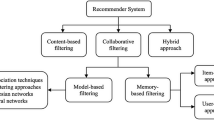Abstract
User based collaborative filtering (CF) has been successfully applied into recommender system for years. The main idea of user based CF is to discover communities of users sharing similar interests, thus, in which, the measurement of user similarity is the foundation of CF. However, existing user based CF methods suffer from data sparsity, which means the user-item matrix is often too sparse to get ideal outcome in recommender systems. One possible way to alleviate this problem is to bring new data sources into user based CF. Thanks to the rapid development of social annotation systems, we turn to using tags as new sources. In these approaches, user-topic rating based CF is proposed to extract topics from tags using different topic model methods, based on which we compute the similarities between users by measuring their preferences on topics. In this paper, we conduct comparisons between three user-topic rating based CF methods, using PLSA, Hierarchical Clustering and LDA. All these three methods calculate user-topic preferences according to their ratings of items and topic weights. We conduct the experiments using the MovieLens dataset. The experimental results show that LDA based user-topic rating CF and Hierarchical Clustering outperforms the traditional user based CF in recommending accuracy, while the PLSA based user-topic rating CF performs worse than the traditional user based CF.


Similar content being viewed by others
References
Adomavicius, G., Tuzhilin, A.: Toward the next generation of recommender systems: a survey of the state-of-the-art and possible extensions. IEEE Trans. Knowl. Data Eng. 17(6), 734–749 (2005)
Blei, D.M.: Probabilistic topic models. Commun. ACM 55(4), 77–84 (2012)
Blei, D.M., Ng, A.Y., Jordan, M.I.: Latent dirichlet allocation. JMLR 3, 993–1022 (2003)
Blei, D.M., Ng, A.Y., Jordan, M.I.: Latent dirichlet allocation. J. Mach. Learn. Res. 3, 993–1022 (2003)
Corpet, F.: Multiple sequence alignment with hierarchical clustering. Nucleic Acids Res. 16(22), 10881–10890 (1988)
Deerwester, S.C., et al.: Indexing by latent semantic analysis. JASIS 41(6), 391–407 (1990)
Griffiths, T.: Gibbs Sampling in the Generative Model of Latent Dirichlet Allocation. Stanford University (2002)
Griffiths, T.L., Steyvers, M.: Finding scientific topics. PNAS 101(Suppl 1), 5228–5235 (2004)
He, T., Du, X., Wang, W., Chen, Z., Liu, J.: Comparing Collaborative Filtering Methods Based on User-Topic Ratings. In: SEKE, pp 312–317 (2013)
Hoeffler, S., Ariely, D.: Constructing stable preferences: a look into dimensions of experience and their impact on preference stability. Journal Of Consumer Psychology 8, 113–139 (1999)
Hofmann, T.: Probabilistic latent semantic analysis. In: Proceedings of the Fifteenth Conference on Uncertainty in Artificial Intelligence, pp 289–296 (1999)
Krestel, R., Fankhauser, P.: Language models and topic models for personalizing tag recommendation. In: Web Intelligence, pp 82–89 (2010)
Milicevic, A.K., Nanopoulos, A., Ivanovic, M.: Social tagging in recommender systems: a survey of the state-of-the-art and possible extensions. Artif. Intell. Rev. 33 (3), 187–209 (2010)
Phan, X.-H., Nguyen, C.-T.: GibbsLDA++: A C/C++ implementation of latent Dirichlet allocation (LDA) (2007)
Qi, Q., Chen, Z., Liu, J., Hui, C., Wu, Q.: Using inferred tag ratings to improve user-based collaborative filtering. SAC, 2008–2013 (2012)
Schein, A.I., et al.: Methods and metrics for cold-start recommendations. In: Proceedings of the 25Th Annual International ACM SIGIR Conference on Research and Development in Information Retrieval, pp 253–260 (2002)
Shepitsen, A., Gemmell, J., Mobasher, B., Burke, R.: Personalized recommendation in social tagging systems using hierarchical clustering. In: Recsys, pp 259–266 (2008)
Su, X., Khoshgoftaar, T.M.: A survey of collaborative filtering techniques. Advances in Artificial Intelligence 2009, 4 (2009)
Wang, W., Chen, Z., Liu, J., Qi, Q., Zhao, Z.: User-based collaborative filtering on cross domain by tag transfer learning. In: Proceedings of the 1st International Workshop on Cross Domain Knowledge Discovery in Web and Social Network Mining, pp 10–17 (2012)
Wang, X., McCallum, A.: Topics over time: a non-Markov continuous-time model of topical trends. In: KDD, pp 424–433 (2006)
Wartena, C., Brussee, R., Wibbels, M.: Using tag co-occurrence for recommendation. In: ISDA, pp 273–278 (2009)
Xiance, S., Maosong, S.: Tag-LDA for scalable real-time tag recommendation. JCIS 6(1), 23–31 (2009)
Yin, H., Cui, B., Huang, Z., Wang, W., Wu, X., Zhou, X.: Joint Modeling of Users’ Interests and Mobility Patterns for Point-Of-Interest Recommendation. In: ACM Multimedia, pp 819–296 (2015)
Yin, H., Cui, B., Lu, H., Huang, Y., Yao, J.: A unified model for stable and temporal topic detection from social media data. In: ICDE, pp 661–672 (2013)
Yuan, Q., Cong, G., Ma, Z., Sun, A., Thalmann, N.M.: Who, where, when and what discover spatio-temporal topics for twitter users. In: KDD, pp 605–613 (2013)
Acknowledgments
This work is supported in part by the National Key Research and Development Program of China (2016YFC0800805), National Basic Research Program of China (973 Program 2014CB340702), the National Natural Science Foundation of China (Grant No. 61170067).
Author information
Authors and Affiliations
Corresponding author
Additional information
This paper is an extension of paper “Comparing Collaborative Filtering Methods Based on User-Topic Ratings”, which was originally published in the proceedings of SEKE13.
Rights and permissions
About this article
Cite this article
He, T., Chen, Z., Liu, J. et al. An empirical study on user-topic rating based collaborative filtering methods. World Wide Web 20, 815–829 (2017). https://doi.org/10.1007/s11280-016-0412-2
Received:
Revised:
Accepted:
Published:
Issue Date:
DOI: https://doi.org/10.1007/s11280-016-0412-2



